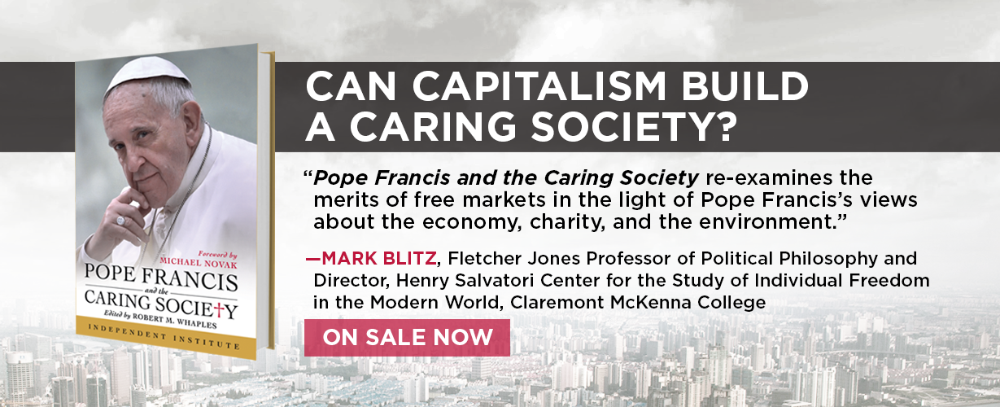The Lighthouse® is the weekly email newsletter of the Independent Institute.
Subscribe now, or browse Back Issues.
Volume 19, Issue 50: December 5, 2017
- Obamacare’s Individual Mandate Is on Its Death Bed
- U.S. an Energy Leader—for Now, at Least
- Pope Francis and the Caring Society in the News
- Responsible Tax Reform . . . When?
- Independent Updates

As the individual mandate draws its last breath (at least by today’s perspective), Americans can sigh with relief. The unpopular mandate was always bad policy based on bad arguments, according to Independent Institute Senior Fellow John C. Goodman, who calls out several lousy rationales in his latest piece at Forbes. Let’s summarize a couple by offering his refutations.
First, an individual mandate, Goodman explains, is not necessary to prevent people from gaming the system. This can be handled effectively the way Medicare does it: by letting “late” enrollers face a premium hike that increases over time. Second, a mandate isn’t essential to prevent free riders. They can be countered by offering a universal health insurance credit: people who turn it down penalize themselves by having to pay higher taxes. Goodman also takes on the arguments that market segmentation is always a bad thing, that healthy buyers are needed to keep down costs for the sick, and that ending Obamacare subsidies is the same as raising someone’s taxes.
“Bottom line: There are no good arguments for keeping the individual mandate,” Goodman writes. “But in getting rid of it, we need to clean up a lot of other problems at the same time.”
It’s Time to Repeal Obamacare’s Individual Mandate, by John C. Goodman (Forbes, 11/20/17)
A Better Choice: Healthcare Solutions for America, by John C. Goodman
Priceless: Curing the Healthcare Crisis, by John C. Goodman

A quiet boom is underway. If that sounds like an oxymoron, then ponder this paradox: the boom entails a fossil fuel that is making air cleaner. That’s because the surge is in shale-gas, used to make liquefied natural gas (LNG), which in some major markets—China especially—is stealing market share from coal. U.S. production of shale-gas rose 12 percent in September, making the United States its largest producer. Unfortunately, American supplies can’t keep up with international demand.
Regulatory hurdles are impeding the construction of LNG export terminals, according to Independent Institute Senior Fellow William F. Shughart II, in an op-ed for The Hill. By 2019, he explains, four terminals are expected to be in operation, up from only one today (in Louisiana), but this increase in exporting capacity may be too little, too late for the United States to remain a top energy exporter.
“Unless and until Congress passes legislation to expedite the [construction-permitting] process, the United States will find itself at a competitive disadvantage with other LNG exporters, such as Australia, Malaysia, Qatar, and Russia,” Shughart writes. “The window of opportunity for ramping up U.S. LNG exports is narrow.”
Regulatory Hurdles Are Hampering Natural Gas Exports, by William F. Shughart II (The Hill, 11/16/17)

Pope Francis and the Caring Society—the Independent Institute’s reply to Pope Francis’s call for a non-sectarian dialogue about capitalism, the environment, and charity—is on a media roll. Edited by Robert M. Whaples and with a foreword by the late Michael Novak, the two-month-old book has already been the subject of 34 interviews or reviews, with several more scheduled for later in December. Three events have featured the book, and more are scheduled for 2018.
What’s driving the huge interest? Aside from our crack publicity team and a wonderful spokesperson for the book—Whaples is also co-editor of The Independent Review—content and timing have played a large role. In response to his call for an open, worldwide discussion, the book engages respectfully with Pope Francis’s views on economics, history, and social philosophy even where it strongly disagrees with him—which is often.
The end result (we think readers agree) is a better-informed understanding about the nature and causes of poverty alleviation, effective resource management, and the market economy. As bestselling author George Gilder says of Pope Francis and the Caring Society, “this luminous work shines through and shrivels the sanctimonious smog of socialist levelers who wreak demoralization and poverty wherever they rule.”
Pope Francis and the Caring Society, edited by Robert M. Whaples

With GOP tax reform (i.e., overall tax cuts) apparently on the horizon—and the prospect of a federal shutdown a mere 10 days away—unchecked government spending is the elephant in the room no one wants to mention. The current tax bill may increase the national debt over ten years by $1 trillion (according to the Joint Committee on Taxation) or $1.5 trillion (according to the Congressional Budget Office). Reports in the media indicate that Republicans will try to enact sweeping cuts to federal entitlement programs next year. But there are good reasons to doubt they will succeed, according to Independent Institute Senior Fellow Ivan Eland, author of Eleven Presidents: Promises vs. Results in Achieving Limited Government.
The fiscally responsible way to approach tax reform, Eland argues at History News Network, is to cut spending first, run budget surpluses for a time, and then cut taxes. The model to follow, in other words, isn’t Ronald Reagan or George W. Bush, whose failure to cut spending led to huge deficits and more debt. It’s Warren Harding, Calvin Coolidge, and Dwight Eisenhower.
“Harding and Coolidge cut taxes but also slashed domestic spending to levels lower than before World War I,” Eland writes. Eisenhower “cut federal spending as a percentage of GDP . . . by cutting defense spending, something Trump seems loathe to do, even though he has succeeded in getting allies to at least pledge more spending for their own defense, and he has complained loudly about past presidents getting us into costly unnecessary wars.” When it comes to cutting federal expenditures, talk is cheap but the status quo comes with a hefty price tag.
Trump’s Another in a Long Line of Fiscally Irresponsible Republican Presidents, by Ivan Eland (History News Network, 11/26/17)
Eleven Presidents: Promises vs. Results in Achieving Limited Government, by Ivan Eland
- Tax Tinkering, by Randall Holcombe
- My Interview with Lenin, One Hundred Years after the Revolution, by Alvaro Vargas Llosa
- Federal Funds Used to Stage “Doggie Hamlet”, by Craig Eyermann
- Fed Chair Wakes Up, Notices National Debt, by Craig Eyermann
- Cities Selling Themselves Out to Amazon, by Craig Eyermann
- California Still Trashing Workers’ Rights, by K. Lloyd Billingsley






